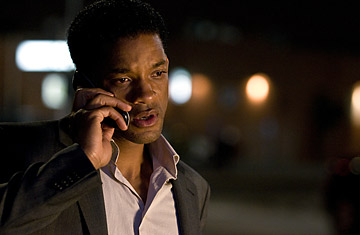
Will Smith in Seven Pounds
(2 of 2)
Director Peyton Reed's early features, Bring It On and Down with Love, were in-your-face comedies with a Pop art design scheme; they aimed to get to endearing by going through aggressive. Reed found a subtler tone in his Vince Vaughn–Jennifer Aniston hit The Break-Up, in which both the humor and the despair rose from domestic behavior that, if exaggerated for dramatic effect, was still recognizable. Yes Man straddles those two styles. It ambles along, Judd Apatow–style (and includes a fellatio gag that should have earned the movie an R rating) while affording Carrey a few opportunities for his patented rubber-face comedy pyrotechnics. The more impressionable kids will be imitating his "Red Bull" riff throughout the holidays.
Though the movie is no more than agreeable, it does provide a swell showcase for New Zealand wundercomic Rhys Darby (Murray, the hapless agent on HBO's Flight of the Conchords) and gives the astrally adorable Zooey Deschanel a rare shot at a lead role in a big Hollywood movie. Casting directors, please take note.
Will Smith: No, Man
Everybody in Yes Man, including Carrey in his depressive phase, is pretty darned perky — a mood that applies to no one in Seven Pounds. And whereas Carl is using his personal epiphany to make himself happy, Ben Thomas does good only for others; he's paying it forward, not inward. A child undergoing cancer treatment, a mother whose boyfriend abuses her, a blind pianist (Woody Harrelson), a young woman suffering from congenital heart failure (Rosario Dawson) — each of these, and three others, he showers with rejuvenating gifts. His motive is the movie's secret.
Directed by Gabriele Muccino and written by Grant Nieporte, Seven Pounds continues a string of movies — The Pursuit of Happyness, I Am Legend, Hancock — in which Smith's characters are isolated and superior, estranged from normal life, ultimately trying to make contact with ordinary folks. It's been ages since the star flashed his charismatic smile for a whole movie. Here he speaks to people with a precise courtesy that seems learned rather than felt. Pain pulses just behind his fretted eyebrows; he carries himself like a hero too gentlemanly to show his grief, too weighed down to hide it. Those whom Ben touches see that he's on a mission beyond making their lives more bearable. The same may be true of Smith: rashly or bravely, he's using his immense celebrity to lure audiences into an alternate movie world where kindness and desperation feed off each other.
In these recent movies, Smith's stature has kept him from connecting with anyone but his own son (in The Pursuit of Happyness, also directed by Muccino) and the mass of moviegoers. Here, though — and this is what lifts Seven Pounds above other Smith dramas — he does tentatively allow another adult onto his solitary planet. Dawson, glammed down in hospital gowns and an invalid's grayish sheen, is knowing, giving and (her word and ours) hot. She's splendid at showing how someone who's tucked herself into the reclusion of her illness wills herself to bloom in the presence of someone with a secret mournfulness greater, and perhaps less curable, than her own. It's a lovely performance, in part because her character throws every charm she's got at the one man who seems doomed to deflect it.
The message of Seven Pounds (other than, Don't text-message while driving) is that even the most depressive person can find a way to make other people happy. If that doesn't sound like a movie to buoy your Christmas spirit, ask yourself this: How often do you sit through a film's closing credits so you have a little private time to wipe away the tears?
